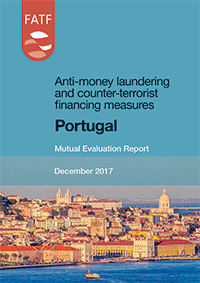Technical Compliance
Ratings which reflect the extent to which a country has implemented the technical requirements of the FATF Recommendations.
C = compliant | LC = largely compliant | PC = partially compliant | NC = non-compliant

Paris, 11 December 2017 – Portugal has a sound and effective regime for fighting money laundering and terrorist financing, but should improve implementation of measures aimed at non-financial business and professions.
The FATF conducted an assessment of Portugal's measures to combat money laundering and terrorist financing.
Portuguese authorities have a good level of understanding of the money laundering and terrorist financing risks they face as do financial sector entities. This is not always the case for non-financial businesses and professions and their supervisors. Portugal should also further explore risks associated with legal persons and arrangements and the non-profit sector, and take appropriate mitigation measures.
Operational authorities involved in money laundering and terrorist financing investigations have access to a wide range of financial intelligence, including comprehensive national databases, and cooperate proactively and collaboratively with foreign counterparts for investigative purposes. Portugal has prioritised asset freezing actions to make crime unprofitable for criminals. However, Portugal should allocate appropriate means and resources to the financial intelligence unit so that it can adequately manage and investigate the increasing volume of suspicious transaction reports, and conduct strategic analysis to identify ML/TF trends and patterns.
Portugal should also maintain adequate and comprehensive ML/TF-related statistics in order to better support and document its understanding and analysis of risks, and demonstrate the actions taken and results achieved.
Portugal has sound laws and regulations to fight money laundering and terrorist financing, but it must continue to fully address all risks identified, with greater focus on higher-risk sectors.
The FATF adopted this report at its November 2017 Plenary meeting.